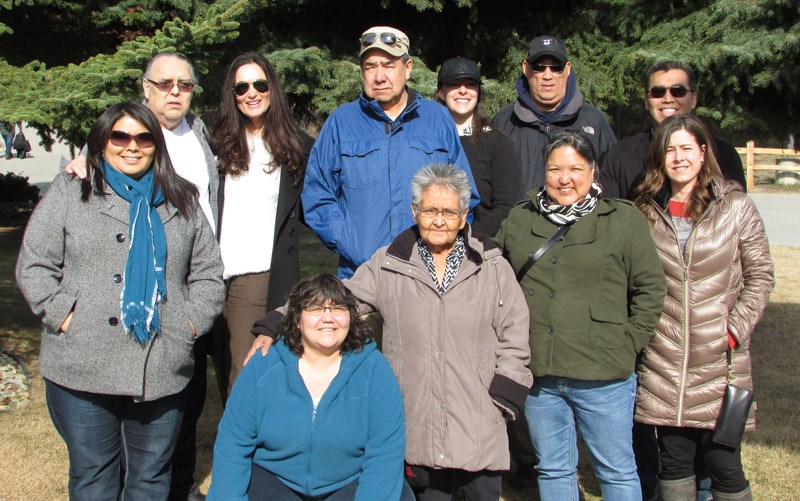Research done in Prince George is now informing a new and ominous report by the Cedar Project, an ongoing data collection program looking into aboriginal victimization.
The Cedar Project has been underway since 2003 and has uncovered drastic per-capita rates of HIV and Hepatitis C in local aboriginal populations, correlations between unstable housing and intravenous drug users and contracting HIV and more correlations between historical trauma and serious life effects.
The Cedar Project is a research partnership led by the University of British Columbia's School of Population And Public Health (Faculty of Medicine) led by head researcher Dr. Patricia Spittal. The data is gathered from study groups in Prince George and Vancouver.
The latest report is entitled Historical Trauma and Vulnerability to Sexual Assault Among Young Aboriginal Women Who Use Illicit Drugs in Two Canadian Cities. It covered the issue of abuses suffered by local victims and according to one of the authors of the paper, Prince George's Mary Teegee of Carrier Sekani Family Services, showed again what the modern effects are of residential schools.
"What we found was a woman who had a parent who attended residential school was two-and-a-half times more likely to be sexually assaulted and then what really really alarmed us was the next discovery that women were 10 times more likely to be sexually assaulted later in life if they had already suffered sexual abuse in their earlier years, so being vulnerable caused you to suffer abuse and that abuse caused you to suffer even greater abuse. It was compounding victimization," said Teegee.
An underlying discovery was how few of those victims ever reported the violent crimes they were struck by, even fewer who attempted to prosecute the criminals, and fewer still who felt they had adequate supports to get through the levels of trauma they felt.
As this picture of violence emerged, the authors of the report looked to an expert in this field. They received counsel and formed a partnership with Sheldon Kennedy, a former NHL player who disclosed systemic sexual abuse at the hands of a junior-league coach. After his playing days ended, Kennedy founded a sexual assault centre in Calgary to help children. He came to Prince George a number of times in the past couple of years to help the Cedar Project understand and take action on the information they were obtaining.
"When we look at these numbers, it is not a set of statistics. It is a set of people, a large number of women," said Teegee. "The biggest question is, why is nothing being done? What is our response going to be? We now know just enough to start really looking into it. This report isn't the answer, it's the call to start really asking the detailed questions and taking targeted steps to respond. Right now the only response is a system that fumbles around, at best, and totally nothing in most instances."
Teegee said Prince George was one of the lucky communities and that ought to scare everyone. "We have a SCAN (Suspected Child Abuse and Neglect) Clinic in Prince George but there is a freaking waiting list," she said. "So if a girl is sexually abused in Prince George she will get to see a counsellor sometime, later, can't tell you exactly when, sorry girl, sorry family, it'll be down the road when we can get around to you. And if you live in a northern B.C. community outside of Prince George, chances are you have nothing at all. Nothing. If a girl or a woman or a man, for that matter, discloses this kind of violent victimization, you'd be amazed at how many are completely on their own. We need wrap-around response services. Otherwise, the act of reporting sexual assault becomes part of the victim's trauma."
That lack of redress for their suffering leads many victims to self-destructive behavior, antisocial thoughts, drug and alcohol abuse, suicidal thoughts, bullying others, and a spectrum of other consequences. It often leads them into positions of vulnerability bringing repeated attacks, and the cycle goes on.
Spittal said this research shows a clear system of abuse.
"So much of it is rooted in historical trauma," said Spittal. "Canada was at war with aboriginal children, through the residential school system, for generations. And there are still profound echoes going through communities today. But kids are amazingly resilient, you just have to ask them about their hopes and dreams, and respond by building supports based on that direct communication."
What Teegee, Spittal and a number of others involved in the latest Cedar Project research hope for most is a crisis response headquarters for northern B.C. to be built in Prince George. Kennedy has personally committed to help that goal.
"The Sheldon Kennedy Centre is a powerful example of strong partnerships, willing hearts, and experts who will ensure abused children and their families receive the coordinated and comprehensive help they require," said Bonnie Johnston, CEO of the Sheldon Kennedy CAC. "With professionals working together in an integrated model of practice we are seeing improved outcomes for children and families and the opportunity to truly understand the impact of this trauma on our children."
Also onside for building the centre in Prince George is Preston Guno, executive director of the Northern First Nations Child and Family Services Council. He is working directly with Kennedy on the creation of such a facility.
"How many more children will we lose to sex work, the streets, violence, and injection drug use before our Nations come together to address the pain and silence surrounding sexual abuse and begin rebuilding our communities?" said Guno.
Teegee said few issues have sparked a coming together like this one. She said 54 of the region's First Nations chiefs have signed their name as supporters of this initiative. Teegee said this was an unprecedented showing of consensus from such a wide number of aboriginal nations in this area. Agreement like that should be honoured with action, she contended.



